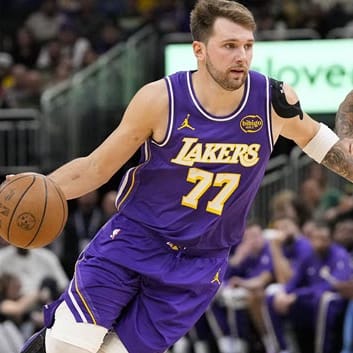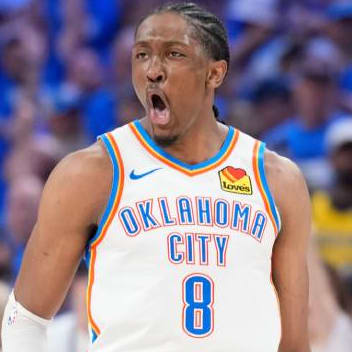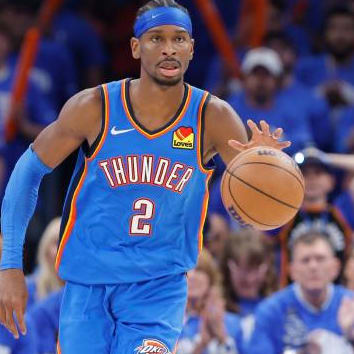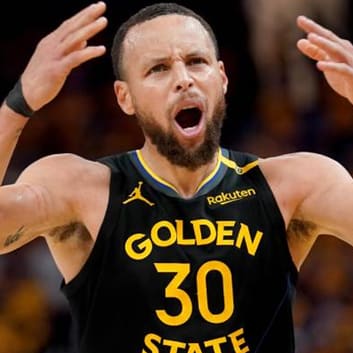OFS
Injury Achilles
Est. Return 10/1/2026
2025 Stats
PTS
0.0
REB
0.0
AST
0.0
STL
0.0
BLK
0.0
ROS Projections
2025 Fantasy Outlook
Lillard tried to play through a calf injury during the 2024-25 playoffs, but he ultimately tore his left Achilles tendon in Game 4 of the opening-round series against the Pacers, which essentially ended the Bucks' postseason run. With 2025-26 likely a lost season for the veteran point guard, Milwaukee waived Lillard this offseason to clear cap space for Myles Turner. Lillard opted not to join a contender and returned to Portland, where he'll serve as a veteran presence this season. Lillard's deal is worth $42 million with a player option for the 2027-28 season and includes a no-trade clause. While it sounds like Lillard plans to return as a go-to player, he'll be 36 years old in 2026-27, so fantasy managers in dynasty leagues should proceed with caution. Read Past Outlooks

Not expected to play this season
Lillard (Achilles) won't be back on the court for the 2025-26 season, as he made clear during an interview with YouTube influencer iShowSpeed on Wednesday.
ANALYSIS
Lillard underwent surgery on a torn Achilles tendon in his left foot over the summer after suffering the injury during the first round of the NBA playoffs with the Bucks against the Pacers. The veteran guard was then waived by Milwaukee on July 1, making him an unrestricted free agent. The future Hall of Famer then decided to return to the Blazers on a three-year contract worth $42 million with a player option for the 2027-28 season. He also has a no-trade clause in his deal.
Lillard underwent surgery on a torn Achilles tendon in his left foot over the summer after suffering the injury during the first round of the NBA playoffs with the Bucks against the Pacers. The veteran guard was then waived by Milwaukee on July 1, making him an unrestricted free agent. The future Hall of Famer then decided to return to the Blazers on a three-year contract worth $42 million with a player option for the 2027-28 season. He also has a no-trade clause in his deal.
NBA Per Game Stats
Per Game
Total
Per 36
NBA Per Game Stats
Loading Per Game Stats...
2024 NBA Game Log
2024
2023
2022
2021
2020
2019
2018
2017
2016
2025 NBA Per Game Split Stats
Schedule
By Month
Starting/Off Bench
Days Rest
Vs Opp
By Result
2025 NBA Per Game Split Stats
Loading Split Stats...
Advanced Stats
Loading Advanced Stats...
Stat Review
2024
2023
2022
2021
2020
2019
2018
2017
2016
How does Damian Lillard compare to other players?
This section compares his stats with all players from the previous three seasons (minimum 200 minutes played)*. The bar represents the player's percentile rank. For example, if the bar is halfway across, then the player falls into the 50th percentile for that stat and it would be considered average.
True Shooting %
62.1%
Effective Field Goal %
54.7%
3-Point Attempt Rate
52.8%
Free Throw Rate
39.6%
Offensive Rebound %
1.6%
Defensive Rebound %
12.2%
Total Rebound %
7.1%
Assist %
29.9%
Steal %
1.4%
Block %
0.4%
Turnover %
9.3%
Usage %
27.8%
Fantasy Points Per Game
42.5
Fantasy Points Per Minute
1.2
NBA Historical Fantasy Stats
Historical ADP
Loading Historical ADP...
Trail Blazers Depth Chart
Our full team depth charts are reserved for RotoWire subscribers.
Subscribe Now
Trail Blazers Rotation: Minutes Breakdown
Loading Trail Blazers Rotation Data...
Average Fantasy Points
Minutes
FanDuel
DraftKings
Yahoo
FantasyDraft
Head2Head
Sorare
Average Fantasy Points are determined when Damian Lillard was active vs. non-active during the season. Click here to view average fantasy points for a different time period.
Loading Average Minutes...
Past Fantasy Outlooks
2024
2023
2022
2021
2020
2019
2018
2017
2016
2015
2014
2013
2012
Last season marked Lillard's first outside of Portland. After 11 seasons with the Trail Blazers, he was traded to Milwaukee, joining forces with Giannis Antetokounmpo. The season had its ups and downs, though the downs - including firing coach Adrian Griffin, Khris Middleton's injuries, and Lillard and Antetokounmpo being hurt in the playoffs - felt more pronounced given the team's expectations. As expected, Lillard's usage took a hit. His 28.4 percent usage rate was his lowest since his third year in the league. Not only that, but his efficiency was below his standards, with the All-Star averaging 24.3 points on 42/35/92 shooting. On a positive note, Lillard appeared in 73 games - his most since 2018-19. He also averaged 7.0 assists to only 2.6 turnovers, which was tied for the second-best assist-to-turnover ratio of his career. Managers who selected Lillard in the first round didn't get what they hoped for, but he was still able to scrape together a top-20 finish in total eight-category fantasy value. Lillard and those around him have cited the change in scenery and disruptive events in his personal life for his down season. However much stock managers want to put into that will be a big determining factor in Lillard's fantasy value. But the reality of Lillard entering his age-34 season and no longer being the No. 1 option on his team isn't up for interpretation.
More Fantasy News

Expected to sign with Portland
Lillard (Achilles) is finalizing a three-year contract with the Trail Blazers, NBA reporter Chris Haynes reports.
ANALYSIS
Subscribe now to instantly reveal our take on this news.
Subscribe now to instantly reveal our take on this news.

Waived by Milwaukee
The Bucks waived Lillard (Achilles) on Tuesday, ESPN's Shams Charania reports.
ANALYSIS
Subscribe now to instantly reveal our take on this news.
Subscribe now to instantly reveal our take on this news.

Tears Achilles, out for season
Lillard has been diagnosed with a left torn Achilles tendon, NBA reporter Chris Haynes reports.
ANALYSIS
Subscribe now to instantly reveal our take on this news.
Subscribe now to instantly reveal our take on this news.

Slated for MRI
Lillard is scheduled to undergo an MRI on his left lower leg Monday, Tim Reynolds of Associated Press reports.
ANALYSIS
Subscribe now to instantly reveal our take on this news.
Subscribe now to instantly reveal our take on this news.

Won't return Sunday
Lillard has been ruled out for the remainder of Sunday's Game 4 matchup against the Pacers due to a left lower leg injury, NBA reporter Chris Haynes reports.
ANALYSIS
Subscribe now to instantly reveal our take on this news.
Subscribe now to instantly reveal our take on this news.
Latest Fantasy Rumors

Confirmed out for season
In an offseason workout with iShowSpeed on Wednesday, Lillard confirmed that he will miss the entire 2025-26 season.
ANALYSIS
Lillard said he has no intention of messing around with his injury given the severity of Achilles tears, adding that he will "probably" be back for the start of the 2026-27 season. Lillard has also expressed how excited he is to be back home in Portland where he can be closer to his family. As for fantasy hoops, Lillard is only worth holding onto in dynasty or keeper formats with this news, and it sets up Jrue Holiday and Scoot Henderson with a safer floor.
Lillard said he has no intention of messing around with his injury given the severity of Achilles tears, adding that he will "probably" be back for the start of the 2026-27 season. Lillard has also expressed how excited he is to be back home in Portland where he can be closer to his family. As for fantasy hoops, Lillard is only worth holding onto in dynasty or keeper formats with this news, and it sets up Jrue Holiday and Scoot Henderson with a safer floor.













